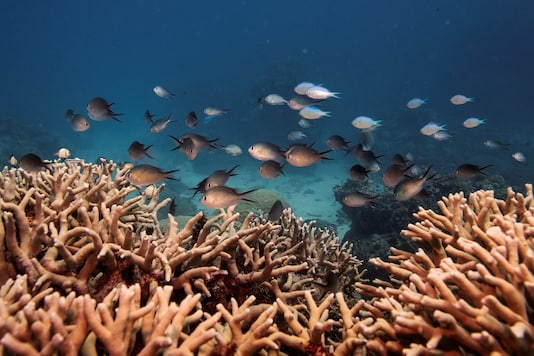Scientists have developed a novel technique to identify heat-stressed corals. The new way found by researchers could prove helpful to marine biologists. The information can help the scientists pinpoint and diagnose what makes the coral species the most vulnerable to global warming and what can protect them from climate change and its repercussions.
The Rutgers-led study, published in the journal Science Advances in January, will aid conservationists to forge targeted marine protections.
Professor Debashish Bhattacharya from the Department of Biochemistry and Microbiology in the School of Environmental and Biological Sciences at Rutgers University, New Brunswick, said in a news release that it is the same as taking a blood test to assess human health.
The senior author elucidated that the coral health can be assessed by measuring the amount of metabolites produced by them. Warming waters result in coral bleaching which is a global ecological disaster. Sensitive diagnostic indicators need to be developed to ensure reef health. It gives room for pre-emptive conservation efforts and can be helpful in monitoring reef health before the visible stage of bleaching.
Coral reefs provide habitat which support much of the ocean's biodiversity and anchor the food chains and ecosystems. Additionally, coral reefs are vital to some of the most important fish stocks in the world. Coral reefs provide coastline protection from flooding, storm surges and erosion. Threats to the corals brought by the warming ocean waters include coral bleaching and disease, sea-level rise, unsustainable fishing, a more acidic ocean, damage from vessels, marine debris, invasive species and tropical cyclones.
For the new study, researchers examined how Hawaiian stony corals react to heat stress, with a goal of recording metabolic, or chemical and indicators of stress. The produced metabolites were analysed and compared with other corals not subjected to heat stress. Algae, which live in symbiosis, abandon their coral homes to flee when the water temperatures are very high. Coral gets colour from the algae which forms a mutualistic relationship with them. So, when the algae leaves the residing skeletal cavities, the corals are left vulnerable losing colour. This results in a white appearance, potentially, the loss of reefs and this phenomenon is what we know as coral bleaching.
The recent lab experiments, performed on heat-resistant as well as heat-sensitive coral species, revealed they respond to heat stress by producing unique metabolites. The research team is currently busy validating their coral diagnosis results and developing a "coral hospital" featuring a new lab-on-a-chip device, which could monitor coral health in real-time.
